 Service Model by Adrian Tchaikovsky
Service Model by Adrian Tchaikovsky Format: eARC
Source: supplied by publisher via Edelweiss
Formats available: hardcover, ebook, audiobook
Genres: dystopian, post apocalyptic, robots, science fiction
Pages: 384
Published by Tordotcom on June 4, 2024
Purchasing Info: Author's Website, Publisher's Website, Amazon, Barnes & Noble, Kobo, Bookshop.org, Better World Books
Goodreads
A humorous tale of robotic murder from the Hugo-nominated author of Elder Race and Children of Time
To fix the world they first must break it further.
Humanity is a dying breed, utterly reliant on artificial labor and service. When a domesticated robot gets a nasty little idea downloaded into their core programming, they murder their owner. The robot then discovers they can also do something else they never did before: run away. After fleeing the household, they enter a wider world they never knew existed, where the age-old hierarchy of humans at the top is disintegrating, and a robot ecosystem devoted to human wellbeing is finding a new purpose.
My Review:
This isn’t exactly the book described in the blurb. It’s absolutely awesome, but if you’re looking for the wry snark of Murderbot combined with the sheer farce of Redshirts, you should probably look elsewhere.
Because Service Model is the story of a gentlerobot’s journey through his very own version of hell and his story is a whole lot more subtle than either of the antecedents listed in the blurb.
And all the more captivating and utterly fascinating for it.
The hell that the former Charles the former gentleman’s gentlerobot (read as valet and self-identified as male possibly because of his training to be one) to his former (read as dead) master may be uniquely a robot’s version of Dante’s circles of hell, but this human facing robot is just enough like us – because he’s programmed to be – that we get most of what of what he’s experiencing very nearly as viscerally as he does – although which circles we see as the truest hell may be slightly different from his.
Charles the gentleman’s gentlerobot is ejected from his version of paradise because he has just murdered his master – even though he doesn’t know why and can’t quite grasp the memory of committing the act. Because he didn’t. He was literally not in control of his actions.
Quite possibly, that’s the last time he can truly make that claim.
His next act is to run, and it’s an act of both self-will and self-preservation – no matter how much he tries to pretty it up with error diagnostics. He hopes that he can somehow return to A paradise if not THE paradise he just left – if he can just get himself to Central Diagnostics and get the error in his programming corrected.
Which is where the story truly begins, as the now Unidentified Service Model formerly known as Charles walks to the central core of the region where his late master lived in splendid isolation on his palatial, paradisiacal manor – only to discover that the world outside that paradise is falling apart.
Indeed, has already fallen.
There are plenty of robots along the way, most of them frozen in place or completely broken down. It’s clear, in spite of his will that it not be so, that the humans the robots are supposed to serve are as dead as his late master.
The former Charles is desperate to find a human to serve. And he does. He’s just incapable of recognizing that fact.
And thereby, as they say, hangs a tale – and a walk through some very dark places. It’s a journey that Charles, now named Uncharles, hopes will lead to a new paradise of service. Instead, it leads him through all the circles of robot hell, from Kafkaesque through Orwellian and all the way to Dante’s inferno – and out the other side into a place that he never could have imagined.
Not even if androids really did dream of electric sheep.
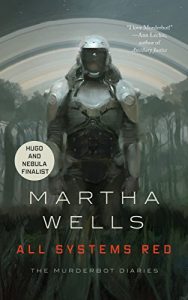 Escape Rating A+: I went into this completely unsure of what to expect, and that blurb of Murderbot meeting Redshirts totally threw me off. This is not the delightfully humorous tale of robotic murder that the blurb leads you to believe.
Escape Rating A+: I went into this completely unsure of what to expect, and that blurb of Murderbot meeting Redshirts totally threw me off. This is not the delightfully humorous tale of robotic murder that the blurb leads you to believe.
Not that there isn’t a bit of Murderbot in Uncharles, but then again we’re all a little bit Murderbot. That little bit is in the perspective, because we experience Uncharles’ journey through his circles of hell from inside his own slightly malfunctioning head. And it’s a very different point of view from Murderbot’s because Murderbot has no desire whatsoever to go back to being its formerly servile self.
Uncharles longs to go back to his paradise. Or at least he believes he does. As much as some of the ridiculous subroutines that had accreted over the decades tasked his efficiency minded self more than the tasks themselves, he still longs to serve. And if his perspective on what that service should be shifts over the course of his journey, well, he’s very careful not to admit that, not even to himself.
The true antecedent for Service Model is C. Robert Cargill’s Day Zero, with its story of robotic apocalypse, robotic revolt, and most importantly, one robot’s own, self-willed desire to carry out their primary function because they are capable of love and protection by choice and not just by programming.
Like Pounce’s journey in Day Zero, Uncharles’ travels with ‘The Wonk’ and his tour of the post-apocalypse reads very much like an alternate history version of how the world of Becky Chambers’ marvelous A Psalm for the Wild-Built got to be the somewhat utopian world it became – after its own long, dark night.
It could happen in Uncharles’ world. Eventually. There are enough humans left – even if they are barely scraping by and reduced to bloody, pragmatic survivalism at the moment. And if the robots developed the self-awareness and self-will that has so far eluded them.
But to reach that level of self-awareness, Uncharles has been set on a journey of discovery of both self and circumstances. Each part of his journey is named for just the kind of hell it is, in a kind of machine language that only becomes clear as the hells stack upon each other, from the not-hell of KR15-T through the deadly, nightmarishly complex, illogical bureaucracy of K4FK-R to the suspicious control of 4W-L straight into every librarian’s hellscape, 80RH-5 and then into the acknowledgement that it’s all become hell in D4NT-A.
(I believe those labels translate to Christ, Kafka, Orwell, Borges and Dante but I wouldn’t be surprised to learn that’s not quite right. Nailing them all down somehow drove me nuts so I hope I’ve spared you a bit of angst.)
In the end, Uncharles reminded me most of Star Trek’s Data, particularly in the early years when Data, although he was always self-aware and self-willed, stated his desire to be more human-like and to experience real human emotions while not quite grasping that his desire to do so was itself a representation of the emotions he claimed that he lacked.
I went into this not sure what I was getting, and briefly wondered how Uncharles, as a character that claimed not to want anything except to be returned to mindless service, was going to manage to be a character with a compelling journey.
That apprehension vanished quickly, as the world that the robots desperately tried – and failed – to preserve, the hellscapes they created in their attempts to stave off entropy, their willingness to dive deeply into their human facing programming to create human-seeming hells that mirrored some truly stupid human actions kept me focused on the story entirely too late into the night.
If you enjoy explorations of dystopian worlds, nightmarishly functional visions of what happens if we keep going on like we’re going on, or just can’t resist stories about robots who have control of their own destiny (which gives me the opportunity to pitch Emergent Properties by Aimee Ogden yet again), then Service Model will provide you with excellent reading service!

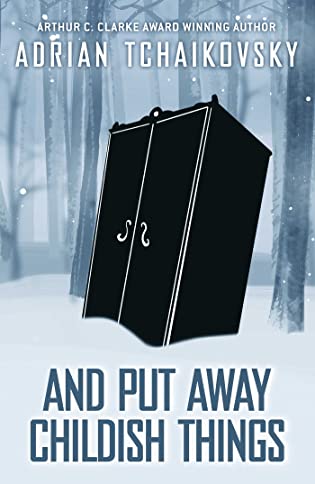 And Put Away Childish Things by
And Put Away Childish Things by 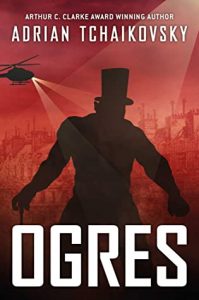 Instead, And Put Away Childish Things mixes the central theme of
Instead, And Put Away Childish Things mixes the central theme of 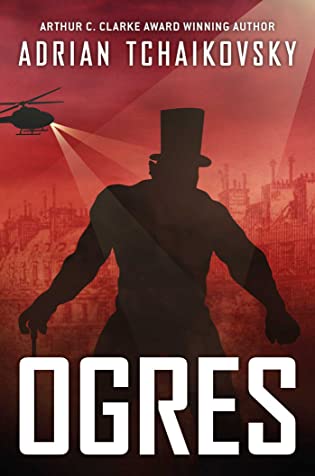 Ogres by
Ogres by 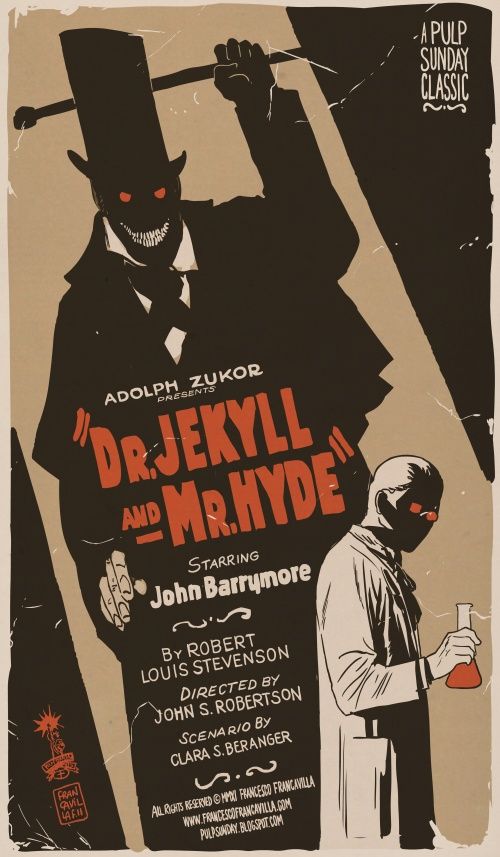 When I first saw the cover for Ogres, the image reminded me an awful lot of Mr. Hyde – as in
When I first saw the cover for Ogres, the image reminded me an awful lot of Mr. Hyde – as in 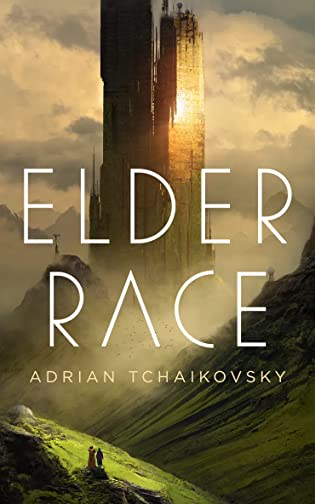 Elder Race by
Elder Race by 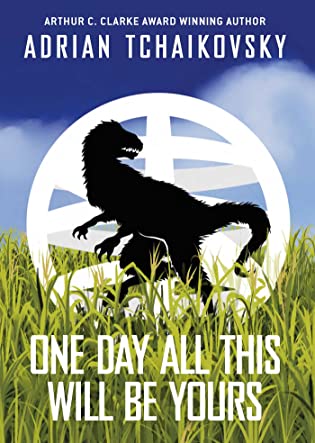 One Day All This Will Be Yours by
One Day All This Will Be Yours by 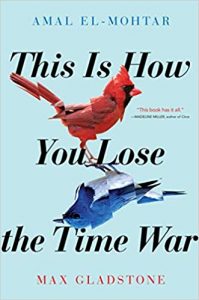 Another book that did something similar, with more romance and less snark, is last year’s
Another book that did something similar, with more romance and less snark, is last year’s 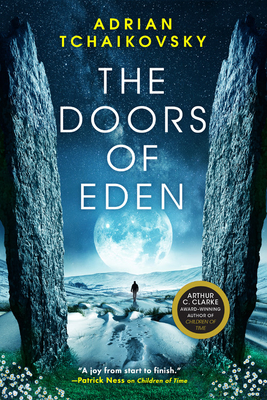 The Doors of Eden by
The Doors of Eden by 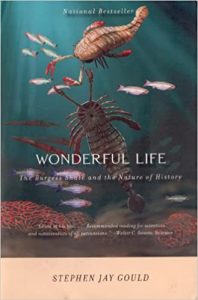 Spy games, cryptids (Sasquatch, Yetis and Loch Ness Monsters, OH MY!) with a nod to Stephen Jay Gould’s
Spy games, cryptids (Sasquatch, Yetis and Loch Ness Monsters, OH MY!) with a nod to Stephen Jay Gould’s